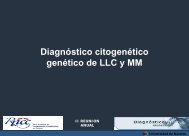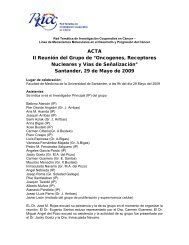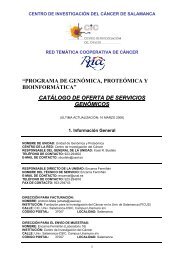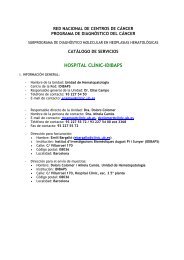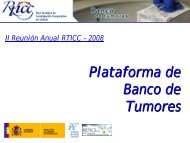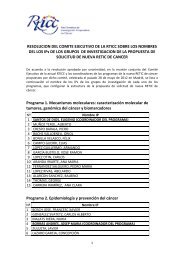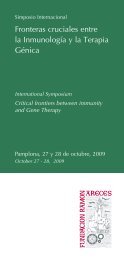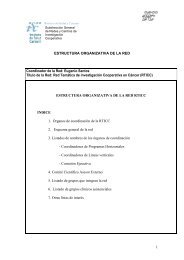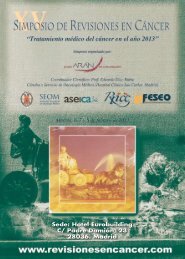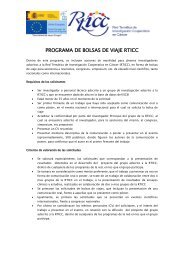Untitled - Red Temática de investigación cooperativa en cáncer
Untitled - Red Temática de investigación cooperativa en cáncer
Untitled - Red Temática de investigación cooperativa en cáncer
You also want an ePaper? Increase the reach of your titles
YUMPU automatically turns print PDFs into web optimized ePapers that Google loves.
P-16<br />
MEAT CONSUMPTION AND OESOPHAGEAL ADENOCARCINOMA RISK IN<br />
THE EPIC COHORT<br />
LUJAN-BARROSO L 1 , JAKSZYN P 1 , AGUDO A 1 , GONZÁLEZ SVATETZ CA 1<br />
1<br />
ICO/IDIBELL, BARCELONA (RD06/0020/0091)<br />
Background: Previous analysis from our group based on only 65 oesophageal a<strong>de</strong>nocarcinomas<br />
cancer (OAC) cases suggest a positive association with processed meat and an<br />
unexpected positive association with poultry. Very little information is available regarding<br />
differ<strong>en</strong>t types of meat intake and OAC in prospective studies.<br />
Objetive: To assess the association betwe<strong>en</strong> meat intake (red, white and processed<br />
meat) and OAC. Estimate the substitution effect of differ<strong>en</strong>t types of meat.<br />
Methods: The EPIC study is a study <strong>de</strong>signed to investigate the relationships betwe<strong>en</strong> diet,<br />
lifestyle, and <strong>en</strong>vironm<strong>en</strong>tal factors and the inci<strong>de</strong>nce of cancer carried-out in 23 c<strong>en</strong>tres<br />
from 10 European countries. Meat intake was estimated based on country-specific food<br />
questionnaires. The hazard ratios (HRs) and their corresponding 95% confi<strong>de</strong>nce intervals<br />
(CIs) for the <strong>de</strong>velopm<strong>en</strong>t of OAC cancer were estimated using the Cox proportional<br />
hazards mo<strong>de</strong>l. Meat intake is pres<strong>en</strong>ted as 25g/2000kcal. All mo<strong>de</strong>ls were adjusted for<br />
BMI, sex, smoking status, educational level, total fruits and vegetables, alcohol and <strong>en</strong>ergy<br />
intake. Additive mo<strong>de</strong>l was constructed to evaluate: 1. additive effect (the risk associated<br />
with to adding the amount of red meat while white meat remains constant). 2. Substitution<br />
effect (the effect of substitution red meat for white meat while keeping total meat<br />
intake constant).<br />
Results: The association betwe<strong>en</strong> total meat intake and OAC was statically significant<br />
(HR: 1.16, 95%CI=1.07-1.27). Additive mo<strong>de</strong>ls shows a positive significant effect of white<br />
meat (HR: 1.22, 95%CI=1.03- 1.45) and processed meat (HR: 1.18, 95%CI= 1.02-1.37).<br />
None substitution effect were found for any meat-type.<br />
Conclusion: We have found a positive significant association betwe<strong>en</strong> processed meat<br />
intake and OAC and a non significant association with red meat intake. An unexpected statically<br />
significant increase of the risk due to white meat intake was observed. Further studies<br />
with large sample size are nee<strong>de</strong>d in or<strong>de</strong>r to clarify these findings<br />
P-17<br />
ΔNP73 UPREGULATION CORRELATES WITH POOR PROGNOSIS OF COLON<br />
CANCER PATIENTS<br />
SAN MILLÁN BLANCO C 1 , SOLDEVILLA NAVARRO B 1 , GIL CALDERÓN B 1 , BONILLA VELASCO F 1 ,<br />
DOMÍNGUEZ MUÑOZ G 1<br />
1<br />
HOSPITAL UNIV. PUERTA DE HIERRO-UAM, MADRID (RD06/0020/0020)<br />
Cumulative data support the role of ∆TAp73 variants in tumorig<strong>en</strong>ic processes such as drug resistance.<br />
We evaluate the impact of TP73 isoforms and their putative target g<strong>en</strong>es ABCB1, HMGB1<br />
and CASP1 on the survival of colon cancer pati<strong>en</strong>ts and the correlation betwe<strong>en</strong> their expressions.<br />
We <strong>de</strong>termined in 77 colon cancer pati<strong>en</strong>ts the expression of Ex2p73, Ex2/3p73, ΔNp73, TAp73,<br />
ABCB1, HMGB1 and CASP1 by RT-PCR. Tumor characteristics, disease-free survival (DFS) and<br />
overall survival (OS) were examined in each pati<strong>en</strong>t. Additionally, functional experim<strong>en</strong>ts were<br />
performed to check whether ectopic expression of ∆Np73 modifies the proliferation, drug resistance,<br />
migration and invasion properties of colon tumor cells and the expression of ABCB1,<br />
HMGB1 and CASP1.<br />
Positive correlations were observed betwe<strong>en</strong> the expression levels of ∆TAp73 variants and HMGB1.<br />
A tr<strong>en</strong>d was also observed for ABCB1. Over-expression of ΔEx2/3p73 and ΔNp73 isoforms significantly<br />
associated with advanced stages (p = 0.04 and p = 0.03, respectively) and predicted<br />
short<strong>en</strong>ed OS (p = 0.04 and p = 0.05, respectively). Similarly, high levels of ABCB1 and HMGB1<br />
associated with shorter OS (p = 0.04 and p = 0.05, respectively). Multivariate analysis showed<br />
that, in addition to the tumor stage, ABCB1 and HMGB1 had in<strong>de</strong>p<strong>en</strong><strong>de</strong>nt relationships with OS<br />
(p = 0.008). Ectopic expression of ∆Np73 associated with an increase in proliferation and drug<br />
resistance. The positive correlation betwe<strong>en</strong> ∆TAp73 variants and HMGB1 and ABCB1 expression<br />
supports them as TP73 targets. The fact that upregulation of ∆TAp73 isoforms associated with<br />
short<strong>en</strong>ed OS, increase in proliferation and drug resistance confirms their oncog<strong>en</strong>ic role and<br />
plausible value as prognostic markers.<br />
ABCB1 and HMGB1, putative ∆TAp73 target g<strong>en</strong>es, strongly predict OS in an in<strong>de</strong>p<strong>en</strong><strong>de</strong>nt manner,<br />
making clear the importance of studying downstream TP73 targets that could predict the outcome<br />
of colon cancer pati<strong>en</strong>ts better than ∆TAp73 themselves do.<br />
60 61



